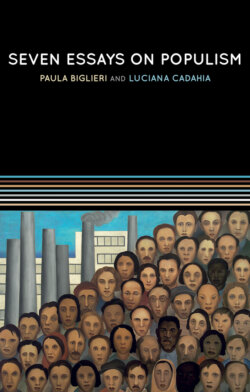Читать книгу Seven Essays on Populism - Paula Biglieri - Страница 8
Notes
Оглавление1 1 www.journalofdemocracy.org/articles/the-populist-challenge-to-liberal-democracy.
2 2 “How Does Populism Turn Authoritarian? Venezuela Is a Case in Point”: www.nytimes.com/2017/04/01/world/americas/venezuela-populism-authoritarianism.html, www.theatlantic.com/international/archive/2017/06/venezuela-populism-fail/525321.
3 3 See Stephan Hahn, summarizing William Galston’s view, in “The Populist Specter,” The Nation, January 28 – February 4, 2019: www.thenation.com/article/archive/mounk-galston-deneen-eichengreen-the-populist-specter.
4 4 “Militant” is an important part of Biglieri and Cadahia’s political theoretical vocabulary. The term translates awkwardly into English, especially American English, where it signifies dogmatic and aggressive and hardened political views and a tendency toward extreme, sometimes violent, actions. By contrast, in French, Spanish, and Italian, its meaning is closer to political engagement as part of a cause, or what Biglieri and Cadahia call collective belonging. In fact, they insist, an emancipatory populist militant has precisely to be non-dogmatic. It would be, they wrote in an email to me, “someone who escapes dogmatism, someone who defends some principles and belongs to a collective formation or organization but, at the same time, is never fully captured by those principles, collective formation and organization. That is to say, someone who is always open to the new, to the critique, to the event.”
5 5 Occupy, it is important to remember, began as a protest against Citizens United, the 2011 Supreme Court decision delivering the coup de grâce to electoral democracy by lifting restrictions on corporate financing of campaigns.
